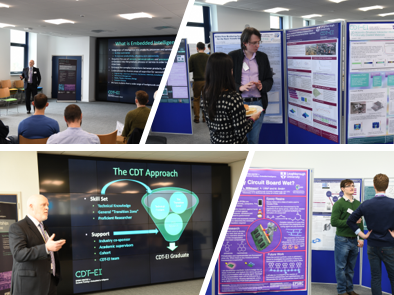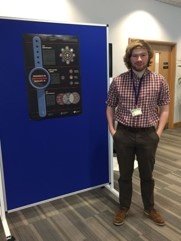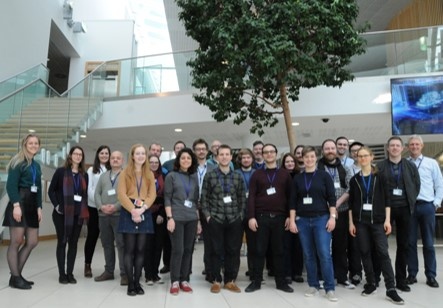Innovation Is Here
16 April 2018
Cohort 4 researcher Jake Rankin describes the event;
The Construction Equipment Association (CEA) held an Innovation Is Here event at One Great George Street, Westminster. Several companies had displays at a mini exhibition such as Nylacast, KHL and Perkins. There was also a huge library owned by the Institute of Civil Engineers even containing a Lego tower bridge (to engage younger, and also older, audiences with civil engineering). The event was sponsored by JCB and Perkins. The reason for visiting was to develop an understanding of the industry position with regards to AI.
The conference was moderated by Nick Higham (BBC broadcaster and journalist) who spoke about the need for the civil industry to move with the times with technology such as Industry 4.0, Internet of things and automation.
CEA Honorary President David Bell (JCB) gave a rundown of the program before introducing the first speaker, Duncan Riding (Senior Technical Steward of Perkins) who gave a talk titled Future Fuels - Diesel, Hybrid Electric...? His talk was broken up into three sections:
- The Important Issue
- Air Quality
- Future Fuels
The issue that Duncan discussed was the need for energy, and focused particularly on how dependent we were on it. This then led to why we still needed Diesel engines and suggested that electric was not yet ready for the demand (this would create an interesting discussion between themselves and Volvo, who were looking at electric technology). Duncan also spoke passionately about climate change and energy, with some good examples on Diesel vs electric cars. The key lesson from that using a basic energy equation could still highlight fundamental issues (such as the required overloading needed to supply a motor power, the amount of battery needed etc).
Air quality was then discussed, focused on particulates. 25-100 micrometers was the harmful range that Perkins needed to address and they presented their latest technology using Diesel Particulate Filters and a a Diesel Exhaust Fluid which reduced particulate emissions by 98%.
Finally, Duncan spoke about the Future of Fuels. He mentioned that in a review paper that 76% of industry leaders believed that hydrogen was the Future, however this was contradicted when further discussions with these leaders yielded concerns for packaging hydrogen and creating an infrastructure, similar issues to electric. This was also supported by a conversation he had with Prof Garner at Loughborough University.
Professor Rob Scott (Advanced Manufacturing Research at University of Sheffield, AMRC with Boeing) gave a talk on the Factory of the Future. He discussed the state of British manufacture when compared to other countries like France and Germany and highlighted that Britain urgently needed to modernise. The key point that he raised was of Horizontal Learning. This is where one industry learns about a technology from another industry, the example he suggested was civil engineering and manufacture. He then went on to discuss the changing customer demands of wanting everything customisable and delivered yesterday and talked about applicable technology that could be used to tackle this such as Cyber-Physical Systems and the Internet of Things. Rob then discussed the five key technologies available to civil engineering:
- AI and machine learning
- VR and AR
- Additive manufacture
- Robotics and automation
- Big data and connectivity
In particular, Rob focused on the importance of data, using famous case studies such as Uber and Airbnb to highlight how industries make money by selling a service, not a product.
The next talk was from Dale Hawkins and Mark Kennedy (UK Plant Operators) titled A View from the Cab - Augmented Reality training. This talk was particularly well received as it addressed a key issue in the industry; young people not going into civil engineering, particularly machine operating. The average age of a plant operator is 54 in the UK and companies were struggling to train up enough young drivers to meet demand. Mark then presented one solution; an AR cab setup to help train drivers in a safe environment whilst also engaging a younger “gaming” generation. This was a popular talk and several people were keen to try out the simulator.
After lunch, Inma Martinez (Deep Science Ventures, Innovator and Data Scientist) gave an insightful talk titled The Future is Now. She spoke about technology trends within information management and gave an overview on the various types on machine learning. It was encouraging to see that Inma spoke highly of Reinforcement Learning. Inma also discussed on of their projects; Blockchain. Inma also discussed about various data-mining methods and spoke about HPC methods and Exascaling (the reduction of data for useable scales) .This is a continually growing list of data that is secured by cryptography. What was also amazing to learn was that she was one of the pioneers of the internet, developing her work at CERN and has been involved with several projects, including helping to develop the first AI for mobile personalisation.
The final talk was from Jenny Elfsberg (Volvo CE, Director of Emerging Technologies) one Does the Construction Industry Need Innovation? The Journey from Manual to Autonomous Equipment. Jenny demonstrated Volvo’s current autonomous technology; an electric dump-truck and a hybrid loader. Jenny then went on to discuss the reasoning behind choosing electric, stating that one of the advantages was the simplicity. In a quarry environment, it could be relatively easy to establish a charging infrastructure because it is a smaller, contained environment. Electrification was also shown to be valuable from a Value Stream Mapping perspective, which aims to highlight waste within a system. The two biggest causes of waste energy were within the hydraulics (12%) and energy losses from the Diesel engine (63%). Because of this, electric energy was investigated where Volvo stated that this loss could be removed with electric hence their switch. Jenny then started explaining the journey needed to go towards full autonomy, comparing it to what Volvo had already developed.
Overall, this was an exciting and thought-provoking conference and gave me an opportunity to talk to leading figures in industry. For more information, please visit https://www.thecea.org.uk








 Each year the Ordnance Survey (OS) invites the PhD students it sponsors to its HQ in Southampton for a workshop involving presentations of each student’s current status and work, panel discussion on topics and general networking. There were 22 PhD students present at the workshop, all from different backgrounds and Universities spanning the UK and even including one person who travelled from New Zealand.
Each year the Ordnance Survey (OS) invites the PhD students it sponsors to its HQ in Southampton for a workshop involving presentations of each student’s current status and work, panel discussion on topics and general networking. There were 22 PhD students present at the workshop, all from different backgrounds and Universities spanning the UK and even including one person who travelled from New Zealand.